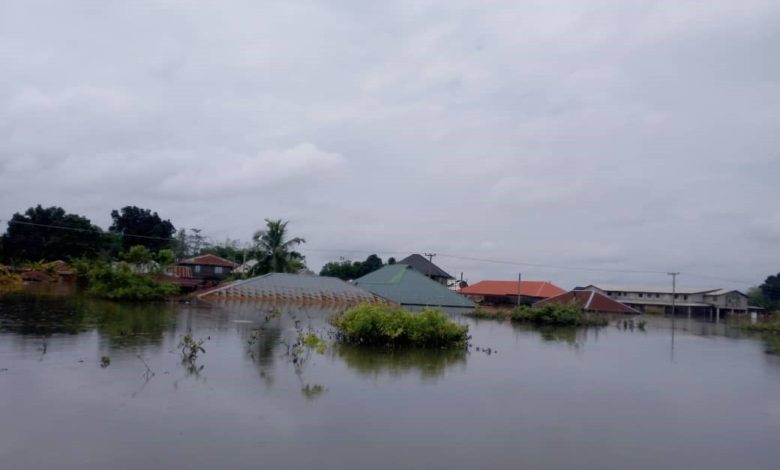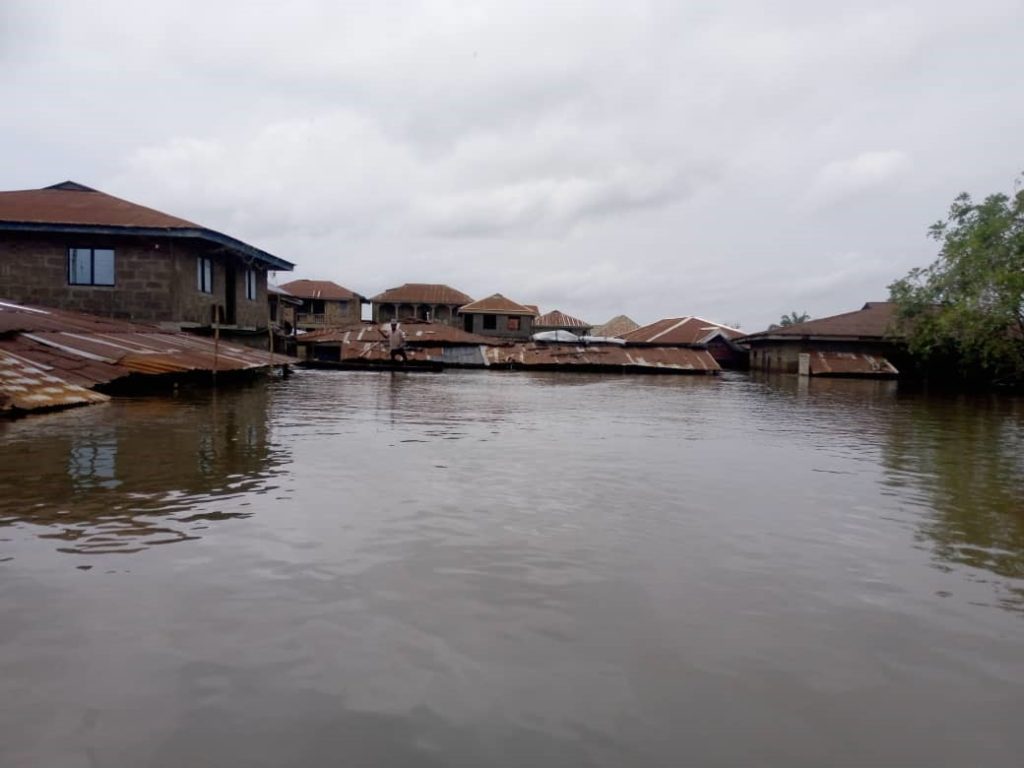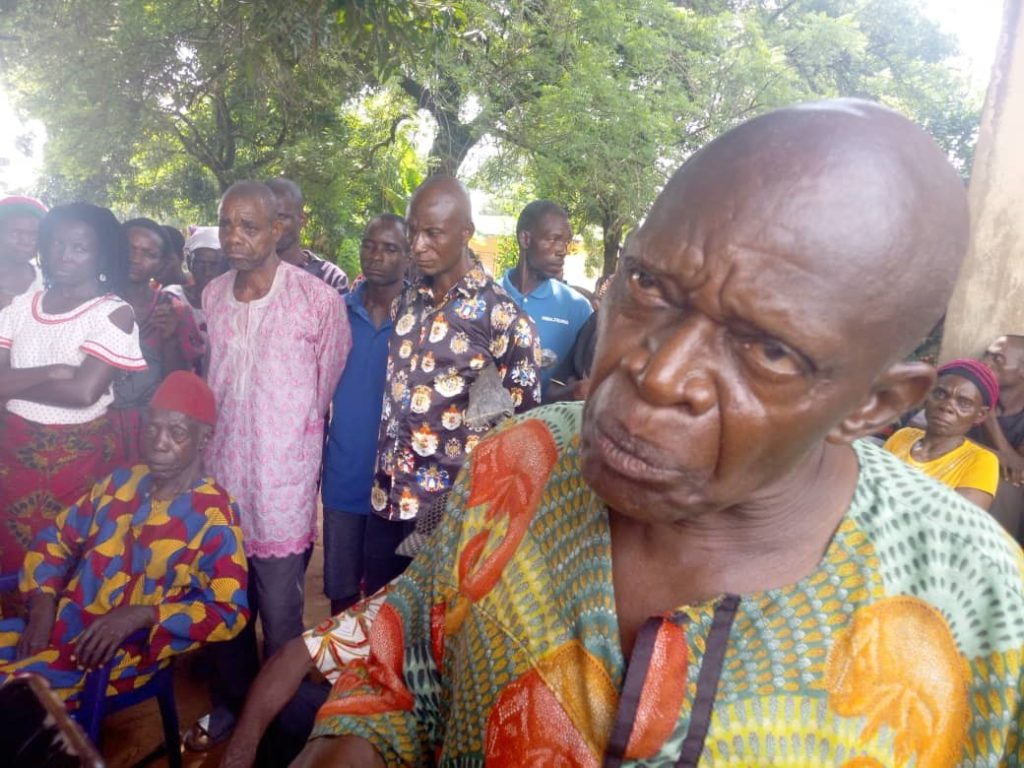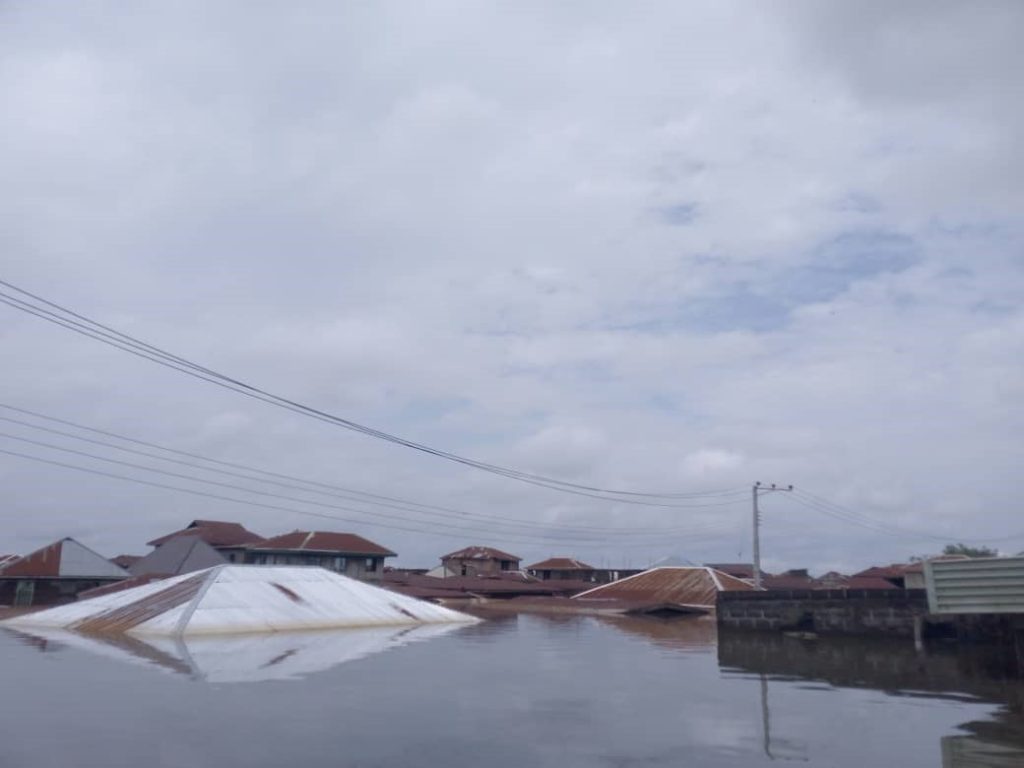Anambra Flood Victims Struggling For Survival

Almost all communities in Anambra East and Anambra West local government areas of Anambra State, Southeast Nigeria, have been submerged in flood for more than six weeks.
The flood from the rise of water from the River Niger is affecting communities in the two local government areas where Omambala River, a tributary of the River Niger, is located.
Omambala River no longer flows into the River Niger because of the rise of the water and as such overflows its banks.
For more than six weeks that the flooding began, people living in bungalows have their buildings totally submerged, while others occupying storey buildings stay in the upper floors, a HumAngle investigation shows.
For the storey building inhabitants, they make purchases for daily needs from persons in water crafts who come around to sell goods to them.
As a result of the flood, public institutions such as schools, worship centres and health centres have closed.
For example, at Enugu-Otu, Aguleri, the gates of St. Paul Catholic Church and St. Paul Secondary School have been shut as the buildings are submerged.
Similarly, health facilities and traditional worship centres in the communities are shut because of flooding.
Some of the affected communities are Anam, Mmiata Anam, Inoma, Umueze Anam, Enugu-Otu, Mkpunando, Eziagulu-Otu and Ifite Ogwari.
Mr Wilson Okoro, who was in a canoe fishing in Enuhu-Otu village, said there was no difference between the river and the land because water had taken over everywhere.
Okoro said fish and dangerous sea animals, including reptiles, had invaded the village.
He said he was living in a storey building and that the people still around were keeping watch over the community as they would not all desert their ancestral home.
Okoro said houses were already collapsing.
“Most people have gone to live with their relations in the upland areas, they managed to escape because the flood came suddenly; all the properties and produce in farms have been destroyed by water.
“There is fish everywhere now. Where we are now is the village square.
“We cannot all leave this town because of water, what we want is that this flood should stop disturbing our peace.
“We are managing the foodstuff we have in the house but we can’t go to farm to get anything again. So, if this water doesn’t recede soon, people may start dying, “ he said.

At Amaifite Enu, Mpkunando, Mrs Igbonasi Ndive, in her late 60s, was selling buns and food items in a canoe.
She said her target were those trapped in storey buildings.
Ndive said staying in camp would have been a good option but food supply was a big issue and that it was better for those who had canoes to go out and fend for themselves.
She said that the people no longer had access to their farms where they could get foodstuffs.
“Water has taken over, we can’t harvest yam, cassava and potato.
“I cannot leave the village because I can’t run away from my home, we cannot be going to camp every time.
” What we want is the solution to this flood because it was not happening for many decades, so, why every year?
“I go from one storey building to another selling buns, bread, groundnut and other things.
“I cannot go live in the camp. Athough I registered at the Igbakwu relief camp, I can’t live there because food is a challenge. So I have to come out to fend for my family,” she said.
In Ifite Anam, villagers reported that a woman died in a canoe while trying to go to the hospital to be delivered of her.baby because medical services were unavailable in the community.
At one of the relief camps in Ifete Ogwari in Anyamelum Local Government Areea, about 300 families camped in the facility over two weeks lacked bedding and medical facilities.
When HumAngle visited, carpenters were trying to fix mosquito nets on the windows.

Mr Onyeka Ejimofor said the people in the camp were in serious need of relief assistance in terms of food and basic necessities of life.
Ejimofor said the people lost everything and some were not sure of where to return after the water had receded as their houses had been destroyed and farmlands washed away.
He said they were farmers and could not survive on bread and tea but on heavy meals..
“We need good money, everyone in camp needs not less than one million naira to sustain them and return to normal life. It will not even be enough because the loss is unquantifiable.
“We don’t have mattresses, mats, cooking utensils, no mosquito nets or blankets or water, we drink from the river.
“We could not bring anything from home and government has not brought anything for us,” Ejimofor said.
Mr Chukwudi Onyejekwe, a director with Anambra State Emergency Management Agency (ASEMA), described the situation as pathetic, saying the state was under siege.
He said the six local government areas seriously affected by the flood were Anambra East, Anambra West, Ogbaru, Awka North, Anyamelum and parts of Ihiala
He said the areas made up 50 per cent of the landmass of Anambra State and that the people were mainly agrarian.
Onyejekwe said no fewer than 34,000 persons had been displaced by the flood with 9,000 taking refuge in camps provided by the government in different parts of the state.
“Government has already intervened. We have created these centres and evacuated people to the camps and needs for minimum comfort are being provided, unfortunately it will never be like their homes.
“Considering what is going on here, there is no amount of food supply that will be enough for them but we will continue to do our best,” he said.
The National Emergency Management Agency (NEMA) has visited the area to assess the situation.

Kennedy Ezeh, who led the assessment team from Enugu zonal office of NEMA, expressed pain that some people were still trapped in their homes and needed urgent assistance.
“The areas affected are the places where people are living, there is so much investment in those places. The issue of rehabilitation will be a complex one but we have to make our report first, “ Ezeh said.
Mr Andrew Nwosu, a resident, said since flooding had become constant in the area, building an all-year-round camp where every household would have a place might be a sustainable solution.
Nwosu said under such arrangement, people could easily relocate to their camp base whenever flood occurred to wait for water to recede.
He also advocated the dredging of the River Niger as a permanent solution to the problem.
Support Our Journalism
There are millions of ordinary people affected by conflict in Africa whose stories are missing in the mainstream media. HumAngle is determined to tell those challenging and under-reported stories, hoping that the people impacted by these conflicts will find the safety and security they deserve.
To ensure that we continue to provide public service coverage, we have a small favour to ask you. We want you to be part of our journalistic endeavour by contributing a token to us.
Your donation will further promote a robust, free, and independent media.
Donate HereStay Closer To The Stories That Matter




